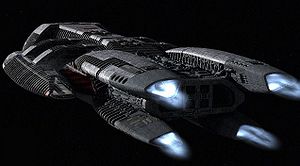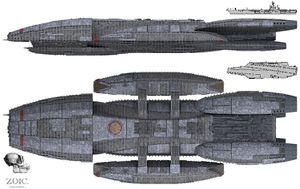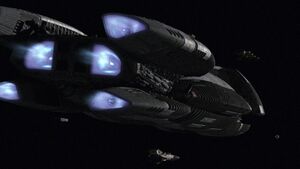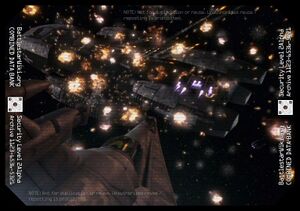Galactica type battlestar
More actions
This article discusses the original battlestar class (of which Galactica is a member) of the re-imagined series. For information on the battlestars of the Original Series, see Battlestar (TOS). For information on the newer Mercury class battlestars, see Mercury class battlestar.

Overview
The battlestar is a capital Colonial warship that combines the functions of aircraft carrier and battleship. The first twelve battlestars were laid down in the early days of the Cylon War, each representing one of the Twelve Colonies (Mini-Series). This article concerns that original, and unnamed, class.
Following the end of the war, the original battlestars remained in service, and many newer battlestars were built. At the time of the Fall of the Twelve Colonies, the soon-to-be-decommissioned Galactica was the last of her kind still in service, and the newer Mercury-class represented the top of the line.
The original battlestars were space-going leviathans of some 4,640ft in length, housing 80 Viper space superiority fighters arranged in 4 squadrons of 20 apiece, and several nuclear warheads. A fully-armed battlestar is capable of a wide range of offensive actions, while her defensive armaments ensure she is fully capable of both protecting herself from attack, and of engaging an enemy at close quarters.
Layout
The design common to Galactica and her sister ships can be broken down into two main sections: the main hull, and the twin flight pods.
Main Hull
This comprises the bulk of a battlestar, and can, itself, be divided into three sections:
The "alligator head" contains the primary living space for the crew, recreational facilities, mess halls, shipboard operations centres (such as the CIC and Situation Room)Template:Ref; water storage tanks (Water).
The midships area contains the pod retraction mechanisms, crossways linking the hanger pods for the transfer of equipment and personnel, as well as all the necessary hoists for such transfers (Mini-Series). Main munitions stores and distribution mechnanisms to "local" munitions stores for main and secondary batteries; fabrication facilities; etc Template:Ref label.
The stern section contains sublight engines, FTL drive coils, etc. Note that 4 of the sublight engines are mounted externally in engine pods, with 2 more mounted between the pods, in the stern of the battlestar's main hull.
Flight Pods
The flight pods are mounted on either side of the hull and contain a battlestar's offensive Viper force. During normal operations, they are extended away from the main hull. During FTL jumps, the pods are retracted against the hull. Each pod comprises two main decks for flight operations: the upper landing bay, which extends the full length of the pod; and the lower launch bays, which provide some 40 launch tubes per pod.
The landing bay serves as a recovery area for incoming Vipers and Raptors. Approaches are made from the stern. The preferred approach is a slow run into the landing bay, prior to making a vertical landing on a defined landing area. However, in emergencies, combat landings can be made, in which a Viper or Raptor approaches at speed and makes a running landing on its undercarriage.
The forward end of the landing bay also serves as a launch area for Raptors and shuttles. The landing bay is large enough to accept a variety of other Colonial vessels, at least as large as "heavy" passenger ships such as Colonial Heavy 798. Docking collars are located throughout the upper sections of the landing bay in order to provide a pressurised connection between a docked vessel and the battlestar. The Flight Pods also have docking ports to dock with larger ships or stations.
The hangar deck within the a flight pod are used as general dispersal areas for Vipers. The hangar deck is used for maintenance & repair of Vipers / Raptors, re-fuelling, re-arming and launch operations. A hangar deck runs the length of the flight pod, but can be divided and sealed off into five sections for damage control puroposes. Each hangar deck section has eight launch tubes, two launch control stations, and an elevator that leads to the landing bay above. Viper flight operations are overseen by a Landing Signal Officer, with each launch supervisor being directly responsible for all launch operations for a group of four launch tubesTemplate:Ref label.
Specifications
Dimensions
Hull:
- Length: 4,640ft or 1.414 km
- Beam: 1,820ft or 555 m (flight pod to flight pod - extended)
- Draft: 580ft or 177 m (source: SciFi.com)
Flight Pods:
- Length (approx): 2,019ft or 615 m
- Beam (approx): 360ft or 110 m
- Draft (approx): 211ft or 64 m Template:Ref

An appreciation of the size of an original battlestar can be gleaned from the following: A battlestar is over 4 times longer than a Nimitz-class US Navy nuclear-powered aircraft carrier. The flight pod of an original battlestar is almost twice the length of a Nimitz class carrier, is some 150ft wider and is approximately as tall as a Nimitz class carrier measured from the waterline to the top of the carrier's communications and ELINT tower. The beam of an original battlestar's "alligator head" is as broad as a Nimitz-class carrier's flight deck is long. Each of the nacelles of an original battlestar's outer four sublight engines is large enough to house a Nimitz-class carrier.
Propulsion

- 2 x FTL engines and drive coilsTemplate:Ref
- 6 x sublight engines
- 2 x Hull-mounted
- 4 x outrigger engine pods
- 40 x maneuvering engines (10 clusters of 4 apiece)Template:Ref.
Despite their massive size, battlestars are extremely maneuverable and can dock with space stations such as the Ragnar Anchorage depot. Battlestars are not designed for atmospheric flight, although their hulls can manage a tenuous upper atmospheric storm like that surrounding the gas giant Ragnar (Mini-Series). A battlestar's FTL systems are capable of very accurate Jumps, able to place them precisely in synchronous orbit above any point on a planet (Mini-Series) and of placing them in the midst of an asteroid field (The Hand of God) or dense fleet of ships (Scattered), without risk of a devastating impact. However, they are grossly inferior to Cylon systems in range (Kobol's Last Gleaming, Part I).
Endurance
Battlestars are intended to operate for long periods without resupply. Their water purification capabilities alone are so efficient that, barring an emergency or unforeseen event, a battlestar can operate without re-tanking "for several years before replenishing" (Water). They also appear capable of undertaking large-scale repairs following battle damage (Mini-Series, Water), and may have small manufacturing/fabrication facilities on-board (Litmus). Vegetable stores and canned goods are kept in titanium lockers (Final Cut).
Computer Systems
The original battlestar vessels deliberately avoided the use of networked computer systems and wireless devices, as the Cylon enemy were adept at infiltrating and subverting such systems (Mini-Series).
Although they do employ computers for such functions as FTL calculations, navigation, damage control and fire control (Scattered), these are not connected with each other. This design is intended to naturally quarantine individual systems in the event that one becomes compromised.
Armament

- 24 large flak turretsTemplate:Ref (mounting 2 guns apiece)
These are mounted on the dorsal and ventral surfaces of the main hull and the ventral surface of the bow. The two guns on each turret fire explosive flak rounds in tandem at a rate of 2.23 seconds per round.
- NumerousTemplate:Ref smaller turrets (mounting 2 guns apiece)
These are smaller two-gun turrets mounted on the flight pods and other surfaces. Each barrel fires non-explosive rounds in bursts, with a rate of fire of 200 rounds per turret per second (estimate based on one tracer per four rounds).
- Multiple nuclear warheadsTemplate:Ref.
- Four squadrons of 20 "Viper" air/space superiority fightersTemplate:Ref. Even the latest Mk. VII vipers remain compatible with this class's launch and recovery facilities.
- NumerousTemplate:Ref "Raptor" reconnaissance vehicles
Crew
Galactica's crew complement prior to her scheduled decommissioning was approximately 2,800Template:Ref. This figure may be higher for a fully staffed and operational battlestar.
Life Support
Approximately twelve oxygen recirculation units are mounted throughout the ship, which replenish oxygen as well as remove ("scrub") carbon dioxide from the air. These devices work continuously (Final Cut).
Sources
- Template:NoteTemplate:Note labelTemplate:Note label No source provided. Figures and comments which are unsourced are being considered for deletion, in compliance with the Citation Jihad.
- Template:Note Calculated based on elevations made available by Zoic.
- Template:Note Tigh: "Engineering/Combat. Please spin up FTL drives One and Two." (Mini-Series)
- Template:Note Originally sourced to Zoic without explanation.
- Template:Note These have been referred to as railguns by some fan sources, but there is substantial evidence to the contrary. See Railgun for more.
- Template:Note Unsourced figures have ranged from 252 to 512. According to the BSG Magazine, the number is 504.
- Template:Note As of the episode "Bastille Day", Galactica was equipped with five nuclear warheads. This may be lower than the typical number, since Galactica was in the process of being decommissioned and had already had most of its ammunition removed. If this is the case, we must conclude that Galactica was unable to reload its supply of nuclear arms at Ragnar Anchorage (a sensible proposition, given the ease with which purported arms smuggler Leoben Conoy was able to gain access to the facility).
- Template:NoteAfter the destruction of 20 Vipers during the Cylon Attack, Galactica was still able to muster a 40-Viper strong defensive screen by combining their remaining squadron of Mk. VII vipers with a full squadron of Mk. II vipers from a museum exhibit in the starboard flight pod. This suggests that Galactica, with a single operational flight pod, was fielding two squadrons from it, and that when fully operational it could have fielded an additional two squadrons from the starboard pod as well.
- Template:NoteAt the time of the Cylon Attack, Galactica was apparently equipped with at least eight. See Galactica Raptor tally for a running count.
- Template:Note See Galactica crew count.
